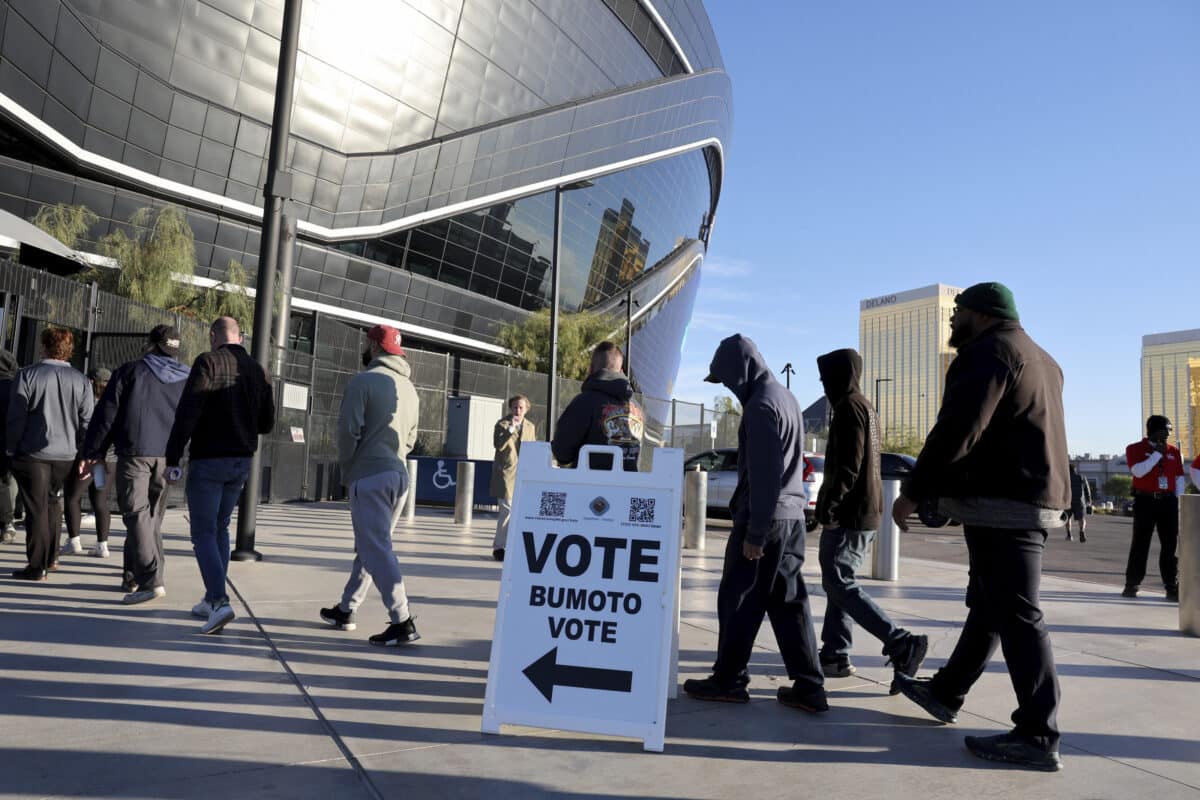Did Filipino Americans make a difference on Election Day?

Voters file into Allegiant Stadium to cast their ballot for the U.S. general election in Las Vegas Tuesday, Nov. 5, 2024. (K.M. Cannon/Las Vegas Review-Journal via AP)
In this historical campaign of 2024, did Filipino Americans make a difference on Election Day nationally? Or maybe the question should be: Did anyone notice us early enough for us to matter where it counts?
The focus of both Trump and Harris has been on battleground states, specifically Wisconsin, Michigan and Pennsylvania. The so called “Blue Wall” states have dominated.
Did you see much attention on AAPIs in those states? Likely not because the numbers for Filipinos or AAPIs just aren’t there in the key swing states.
But of the alternate routes to victory – through the secondary swing states of Nevada, Arizona, Georgia and North Carolina – Nevada stands above them all with the largest proportion of Asian American voters with an electorate that is 12 percent AAPI.
And in that key swing state which group has the most Asian Americans?
Filipinos with nearly 60,000 registered voters in Nevada.

Former President Barack Obama addresses a crowd that includes many Filipino Americans during a recent campaign in Las Vegas. CONTRIBUTED
But as usual, no one knew what to do with us. Or how to find us. There are still problems in voter rolls because of our Spanish last names. How many mailers from LULAC, the Latino group, have you gotten this campaign cycle?
And then there’s the question of whether Filipinos would even turn out. Our 2020 turnout levels in Nevada were the lowest for our group, according to AAPI Data. Not exactly a ringing endorsement for a campaign to invest time and energy.
In other words, we are too easily overlooked. It’s more convenient for a campaign to say, “Filipinos? We’ll reach them in the English language effort.”
In a race with the potential of the first female, African American, Asian American candidate in American history who could be president, Filipinos got homogenized.
Again.
A source of mine who was in consultation with the Harris campaign mid-October expressed frustration in trying to get the campaign to focus on Filipinos.
“I said, you guys are f—ing up,” the source told me. “You are treating the Filipinos like white people. You are not communicating the message that the Filipinos can relate to.”
It’s too common to throw a blanket around us, not even an Asian American, but a white blanket, then wonder what’s that big bump underneath?
It’s happened again.
My source said, the Harris campaign saw too many cases of Filipinos supporting Republican candidates for Senate and in local races. White people in Barong Tagalogs looking for votes the old fashion way. They saw Jo Koy’s mom acting as a Republican surrogate.
The notorious Republican lean of late immigrant and second-generation Filipinos was an obstacle for Filipinos who backed Harris to convince the campaign that Filipinos were a potential force.
One source told me, the numbers are more even between Democrat-Republican, with many Republicans seen as independents who would be attracted to the coalition that Harris built with conservative Liz Cheney.
But would it amount to a bigger turnout than the disappointing 2020 showing? That turnout is often explained away that as service workers primarily, it’s hard for many of the working-class Filipinos to get to the polls on Election Day.
That’s easily taken care of with early or mail-in voting. But that message needs to be coordinated, preferably through the different parties and campaigns.
When I was in Las Vegas in October, I didn’t see many people engaged in general, But I did see “Pinoy Pride” billboards throughout the city. Apparently in the last week, Las Vegas is seeing a Harris ad featuring Filipino businessman Joel Enriquez.
It’s part of a slow roll of recognition. A recent New York Times piece spends more time being a history lesson to mainstream readers about Filipinos. The general ignorance about our Filipino American community is appalling.
But ignorance reigns.
Still there’s hope. This campaign season found the Puerto Ricans after a comedian’s remark at the Trump Madison Square Garden hate rally called the country “garbage.”
Suddenly, the mainstream media found out that the key swing state of Pennsylvania had about 456,000 Puerto Ricans. And they are voting angry. Nationwide there are about 5.6 million Puerto Ricans. A bit more than the 4.2 million Filipinos.
But look at how the Puerto Ricans are in the heavy weight class as some commentators are saying the angry Puerto Rican vote on this day matters. In an election on the margins, it does.
Maybe we need an insult comic to call the RP garbage?
Emil Guillermo is a journalist and commentator. He writes a column for the Inquirer.net’s US Channel. See his micro-talk show on www.patreon.com/emilamok. On election eve, he performs an excerpt from his Emil Amok Monologues, “Transdad,” Nov. 4 and 18 at the Marsh, 1062 Valencia St., San Francisco. Tickets here: https://themarsh.org/monday-night-marsh-stream/

